Blog

Software Engineer Career Path
Software Engineer Career Path
December 31, 2025
Software engineering in 2025 isn’t just about coding- it’s about creating intelligent systems that shape the world. From AI-driven applications to blockchain ecosystems and green computing, software is the engine behind every major innovation today. The demand for engineers who can design, automate, and optimize modern systems has never been higher.
.avif)

INTRODUCTION
Software engineering in 2025 isn’t just about coding- it’s about creating intelligent systems that shape the world.
From AI-driven applications to blockchain ecosystems and green computing, software is the engine behind every major innovation today. The demand for engineers who can design, automate, and optimize modern systems has never been higher.
But here’s the truth: 2025 is not 2015.
Back then, knowing Java or building a mobile app was enough to stand out. Now, companies want engineers who can build scalable AI solutions, design secure cloud architectures, and automate entire workflows. The skills—and opportunities—are evolving fast.
So if you’re a student, graduate, or working engineer wondering “Where should I focus my career now?” this guide will give you the clarity you need.
We’ll explore the 15 most in-demand and future-ready software engineering roles for 2025-26, highlight key salary insights, and show how we can help you master the skills that truly matter.
The Changing Face of Software Engineering (2025 Edition)
The software industry is expanding faster than ever before and the numbers prove it.
- Jobs in AI/ML engineering grew by 25% in 2025, with over 35,000 new openings in the first quarter alone (Veritone, 2025).
- Professionals with AI and data analytics skills now earn up to 56% more than traditional developers (PwC Global AI Jobs Barometer).
- Cloud architecture roles, especially in AWS and Azure, are growing at record speed, commanding some of the highest salaries in tech.
- Meanwhile, cybersecurity and DevOps engineers have become indispensable for digital reliability and resilience.
Even niche areas like quantum computing and site reliability engineering (SRE) are moving from research to reality, creating high-paying career paths for early adopters.
According to the U.S. Bureau of Labor Statistics, software development jobs are expected to grow by 17.9% by 2033, far faster than most industries.
The takeaway?
|| Software is still booming, but the types of software jobs are evolving dramatically.
If you want to future-proof your career, it’s time to understand what’s coming next.
In the next section, we’ll uncover 15 game-changing software engineering career paths that are shaping 2025—and how you can start building the skills to succeed in them .
Why 2025–26 Will Be Game-Changing for Developers
Today, coding isn’t just about writing lines of syntax. It’s about building smart systems that can learn, adapt, and think for themselves. From AI-driven software development to cloud computing innovations and cybersecurity breakthroughs, the opportunities for engineers in 2025–26 are enormous.
According to Gartner (2024), by 2026 nearly 70% of development teams will be using AI-assisted coding tools, reducing project timelines and opening the door to more creative problem-solving. Meanwhile, LinkedIn’s Emerging Jobs Report shows a projected 35–40% growth in demand for roles such as AI engineers, cloud architects, and cybersecurity specialists.
Additionally, site reliability engineering is becoming a cornerstone of modern IT operations, with Google site reliability principles defining the gold standard. On the horizon, quantum computing promises to redefine computation itself, offering a rare opportunity for early career specialists.
This means the future isn’t just about coding ,it’s about building the systems that will shape tomorrow. Whether it’s in healthcare, education, finance, or sustainability, every sector is becoming dependent on smarter software. And here’s the real question: Will you be ready to build it?
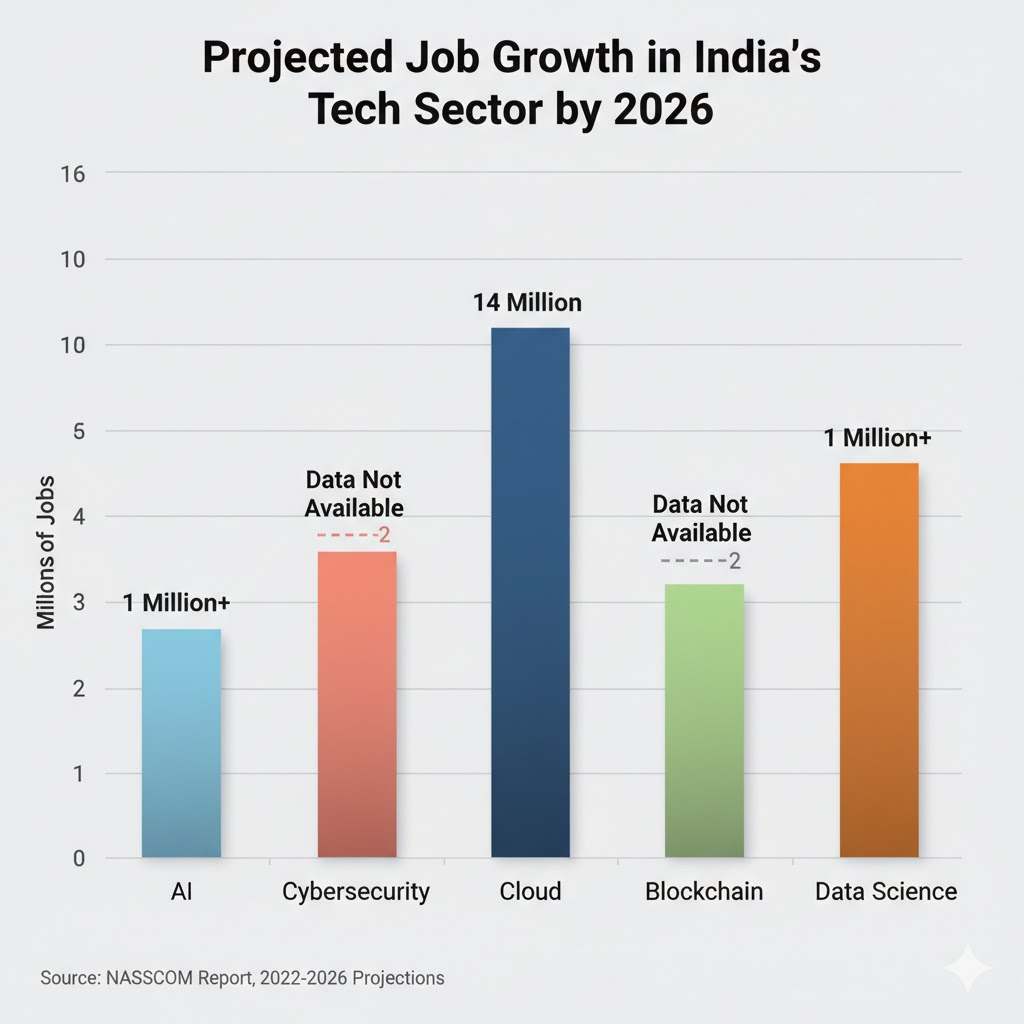
The 15 Core Career Paths Every Software Engineer Should Know
The software landscape in 2025 is full of new possibilities from AI to quantum computing. Here are the 15 most in-demand and high-growth software engineering roles you should know if you want to future-proof your career.
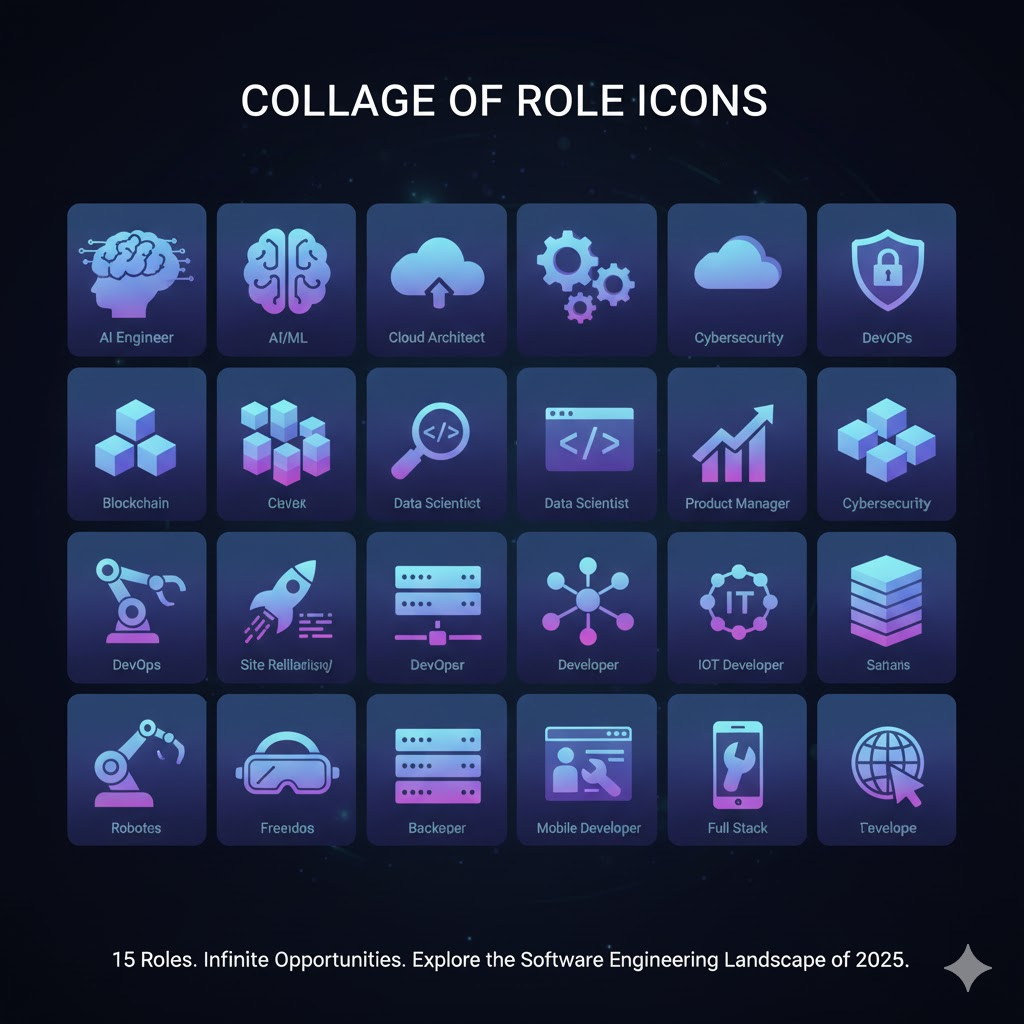
AI/ML Engineer
If you love teaching machines to think, this is your playground. AI/ML Engineers create smart systems that can predict, automate, and make decisions from Netflix recommendations to self-driving cars.
- What they do: Build systems that learn, predict, and automate — from Netflix recommendations to self-driving cars.
- Why it’s hot: AI is transforming every industry, creating endless demand for experts who can train and deploy intelligent models.
- Skills needed: Python, TensorFlow/PyTorch, statistics, and machine learning algorithms.
- Tools: Jupyter Notebook, Google Colab, Scikit-learn.
- Average salary: ₹14–25 LPA (India) / $120K (Global).
Cloud Solutions Architect
Think of Cloud Architects as digital builders , they design and manage large-scale cloud systems that keep apps running smoothly and securely.
- What they do: Design and manage large-scale, secure, and cost-efficient cloud systems.
- Why it’s growing: Nearly every enterprise is going “cloud-first.”
- Skills needed: AWS, Azure, or GCP; networking; system design; DevOps fundamentals.
- Tools: Docker, Kubernetes, Terraform, AWS CloudFormation.
- Average salary: ₹20–35 LPA / $140K globally.
DevOps Engineer
DevOps Engineers are the bridge between developers and operations teams. They make sure code moves from laptop to live server quickly and without chaos.
- What they do: Bridge the gap between coding and deployment by automating delivery pipelines.
- Why it’s essential: Businesses want faster, more reliable releases.
- Skills needed: CI/CD, scripting (Bash/Python), automation, and cloud integration.
- Tools: Jenkins, Git, Docker, Kubernetes.
- Average salary: ₹10–18 LPA / $110K globally.
Cybersecurity Engineer
These are the digital bodyguards of the tech world keeping hackers out and data safe.
- What they do: Protect systems, networks, and data from cyber threats.
- Why it matters: Every company now faces daily security risks.
- Skills needed: Ethical hacking, cryptography, vulnerability testing.
- Tools: Wireshark, Metasploit, Splunk.
- Average salary: ₹12–22 LPA / $115K globally.
Data Engineer
Data Engineers are the unsung heroes behind every data-driven decision. They build the systems that collect and process massive datasets for analysis.
- What they do: Build systems to collect, clean, and manage massive datasets for analytics and AI.
- Why it’s valuable: Data drives every business decision today.
- Skills needed: SQL, Python/Java, ETL, and data warehousing.
- Tools: Apache Spark, Hadoop, Snowflake.
- Average salary: ₹8–18 LPA / $100K globally
Full Stack Developer
Full Stack Developers are all-rounders , they can handle both the front and back ends of a website or app.
- What they do: Handle both front-end and back-end development for web and mobile apps.
- Why it’s popular: Companies value developers who can build complete solutions.
- Skills needed: HTML, CSS, JavaScript, React/Node.js, databases.
- Tools: VS Code, Git, Postman, Docker.
- Average salary: ₹6–14 LPA / $90K globally.
Blockchain Developer
Beyond crypto, blockchain is changing how industries handle security, transparency, and transactions.
- Why it’s expanding: From finance to gaming, blockchain applications are growing rapidly.
- You’ll need: Solidity, cryptography, and blockchain frameworks.
- You’ll use: Ethereum, Hyperledger, Truffle Suite
- Average pay: ₹12 to ₹22 LPA in India, $110K globally.
QA Engineer
QA Engineers ensure every product released is bug-free and user-ready.
- Why it’s essential: With software becoming more complex, quality assurance keeps user trust intact.
- You’ll need: Automation testing, scripting, and a detail-oriented mindset
- You’ll use: Selenium, JIRA, TestRail.
- Average pay: ₹6 to ₹10 LPA in India, $80K globally.
Embedded Systems Engineer
If you’ve ever used a smartwatch, car sensor, or smart home device , that’s the work of an Embedded Engineer.
- Why it’s growing: IoT, wearables, and automation need experts who can code hardware-level systems.
- You’ll need: C/C++, real-time systems, debugging.
- You’ll use: Keil, Oscilloscopes, Logic Analyzers.
- Average pay: ₹8 to ₹16 LPA in India, $95K globally.
Mobile App Developer
The world runs on apps and mobile developers bring those ideas to life.
- Why it’s booming: Every brand wants a mobile presence, and app innovation is at its peak.
- You’ll need: Kotlin/Java, Swift, Flutter, or React Native.
- You’ll use: Android Studio, Xcode, Flutter, React Native.
- Average pay: ₹6 to ₹14 LPA in India, $85K globally.
Game Developer
Game Developers blend art and code to create worlds people escape into from console games to AR experiences.
- Why it’s flourishing: Gaming is now one of the biggest entertainment industries worldwide.
- You’ll need: C++, Unity or Unreal Engine, and a solid grasp of game physics.
- You’ll use: Unity, Unreal Engine, Blender.
- Average pay: ₹8 to ₹15 LPA in India, $90K globally.
Site Reliability Engineer (SRE)
SREs ensure that apps and systems stay reliable, fast, and always available.
- Why it’s vital: Downtime costs companies millions, so reliability experts are indispensable.
- You’ll need: Programming, system design, and monitoring.
- You’ll use: Prometheus, Grafana, Kubernetes.
- Average pay: ₹14 to ₹25 LPA in India, $120K globally.
UX/UI Designer
UX/UI Designers make technology beautiful, intuitive, and easy to use. They combine creativity with user psychology to craft great experiences.
- Why it’s growing: Businesses now compete as much on user experience as on features.
- You’ll need: Wireframing, prototyping, usability testing.
- You’ll use: Figma, Adobe XD, Sketch.
- Average pay: ₹6 to ₹12 LPA in India, $80K globally.
Robotics Software Engineer
These engineers make robots think, move, and interact with the real world from warehouse bots to medical robots.
- Why it’s emerging: Automation is reshaping industries, and robotics expertise is key to that shift.
- You’ll need: ROS, C++, Python, computer vision.
- You’ll use: ROS, Gazebo, MATLAB, OpenCV.
- Average pay: ₹10 to ₹20 LPA in India, $100K globally.
Cloud-Native Developer
Cloud-Native Developers create apps designed to run seamlessly in cloud environments scalable, efficient, and future-proof.
- Why it’s accelerating: Cloud-native is becoming the new standard for software development.
- You’ll need: Cloud platforms, microservices, API design.
- You’ll use: Docker, Kubernetes, AWS Lambda.
- Average pay: ₹12 to ₹22 LPA in India, $110K globally.
The 3 Emerging & Adventurous Tech Roles
Quick Fact
👉According to LinkedIn’s Emerging Jobs Report 2025, AI engineers, cloud architects, and cybersecurity experts are among the top 10 most-hired roles worldwide with India ranking as the #2 talent hub after the U.S.
Skills That Will Rule the Future
The future isn’t arriving someday ,it’s already here, reshaping how we work, create, and even think. Those who learn, adapt, and try new things will lead these changes.
If you want to succeed in 2025–26, these skills will help you stay relevant and become hard to replace.
- AI & Machine Learning:Machines are learning how to think. Humans are needed to guide them. Knowing how to train AI, analyze data, and build ethical AI systems is a useful skill. This is part of everyday work now.
- Data Analytics:Learn data flow diagrams in software engineering for efficient analysis.
. Recognising patterns, visualising data, and explaining information can help you move from technical work to making business choices.
- Cloud Computing:Learning how to build, launch, and manage cloud systems makes you an important problem-solver. AWS Cloud Architect salary and cloud architect jobs reflect this.
- Cybersecurity:As technology improves, so do cyber threats. Security specialists protect data and systems. They are important to keeping information safe.
- DevOps:DevOps combines software development and IT operations. It helps create better software faster. If you like fixing problems and improving systems, this is a good area for you.
- UI/UX Design:Technology must be easy to use. Good designers make systems that are simple and comfortable. They understand users and create good experiences for everyone.
- Full Stack Development: Full stack developer Java web salary per month remains a strong incentive.
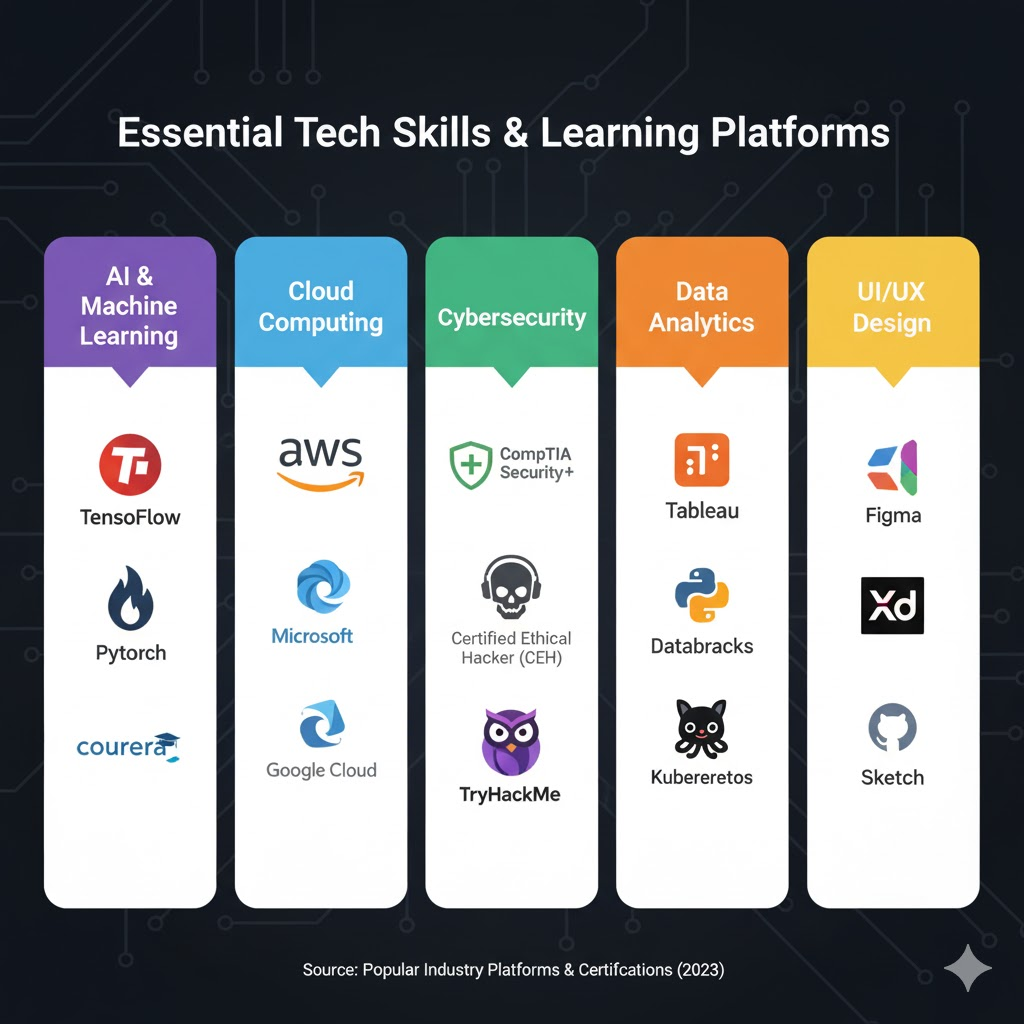
Salary Trends & Market Insights
Employers now value impact over skills, they pay for engineers who deliver measurable results.
Roles in AI, cloud, and cybersecurity have seen 30–40% salary growth in the past two years.
Quick Insights:
- Cloud engineers in India earn ₹14–28 LPA.
- Cybersecurity jobs have grown over 30% year-over-year.
- AI/ML professionals command up to 56% higher salaries globally.
Career Tip:
Show results, not just skills — e.g., “Reduced server costs by 20%” or “Improved uptime by 99.9%.” That’s what gets you better offers.
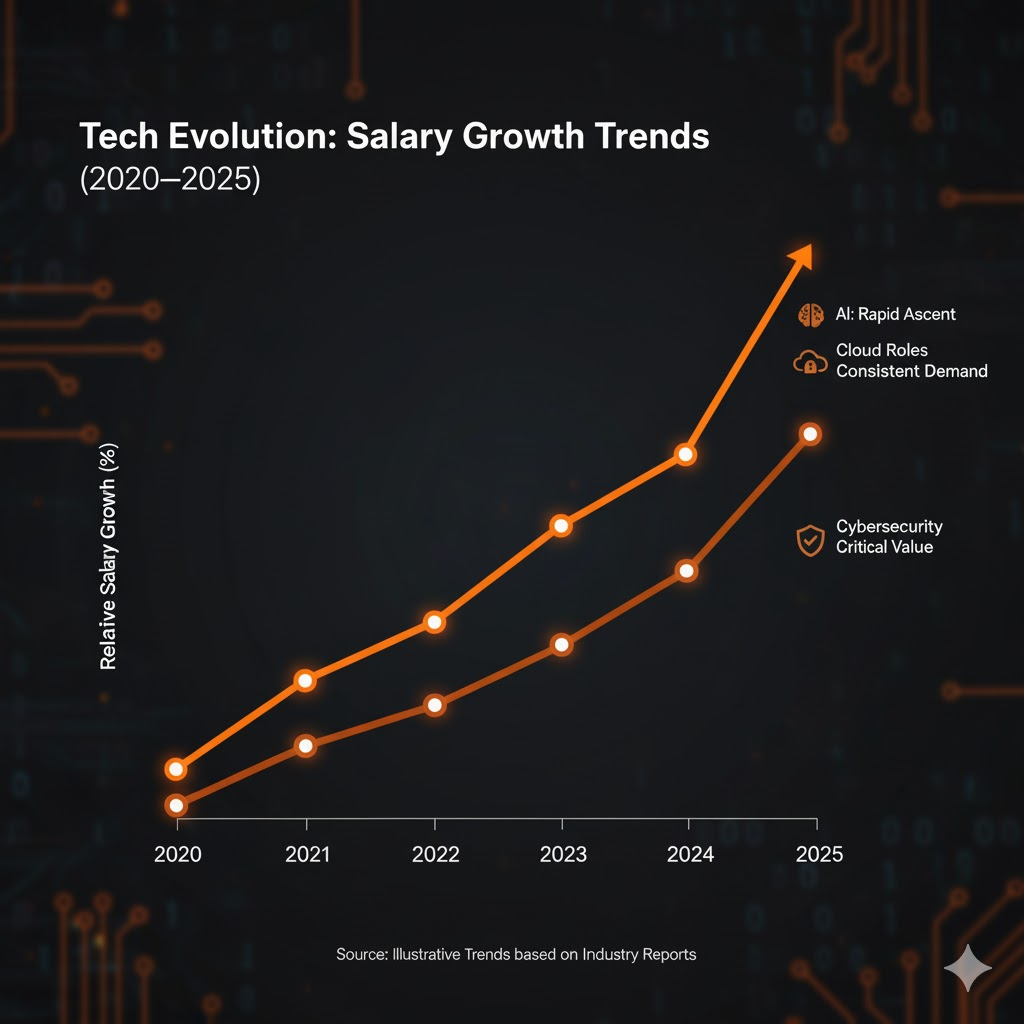
Learning to code is one thing, building real projects is what gets you hired.
How Meritshot Helps You Get There:
- Build real-world projects aligned with in-demand tech roles.
- Learn from experienced mentors who review your work weekly.
- Develop a portfolio that proves your skills — not just certificates.
Start your journey today:
Book a free 15-minute roadmap call, choose your ideal career path.
Real projects. Real mentors. Real results.
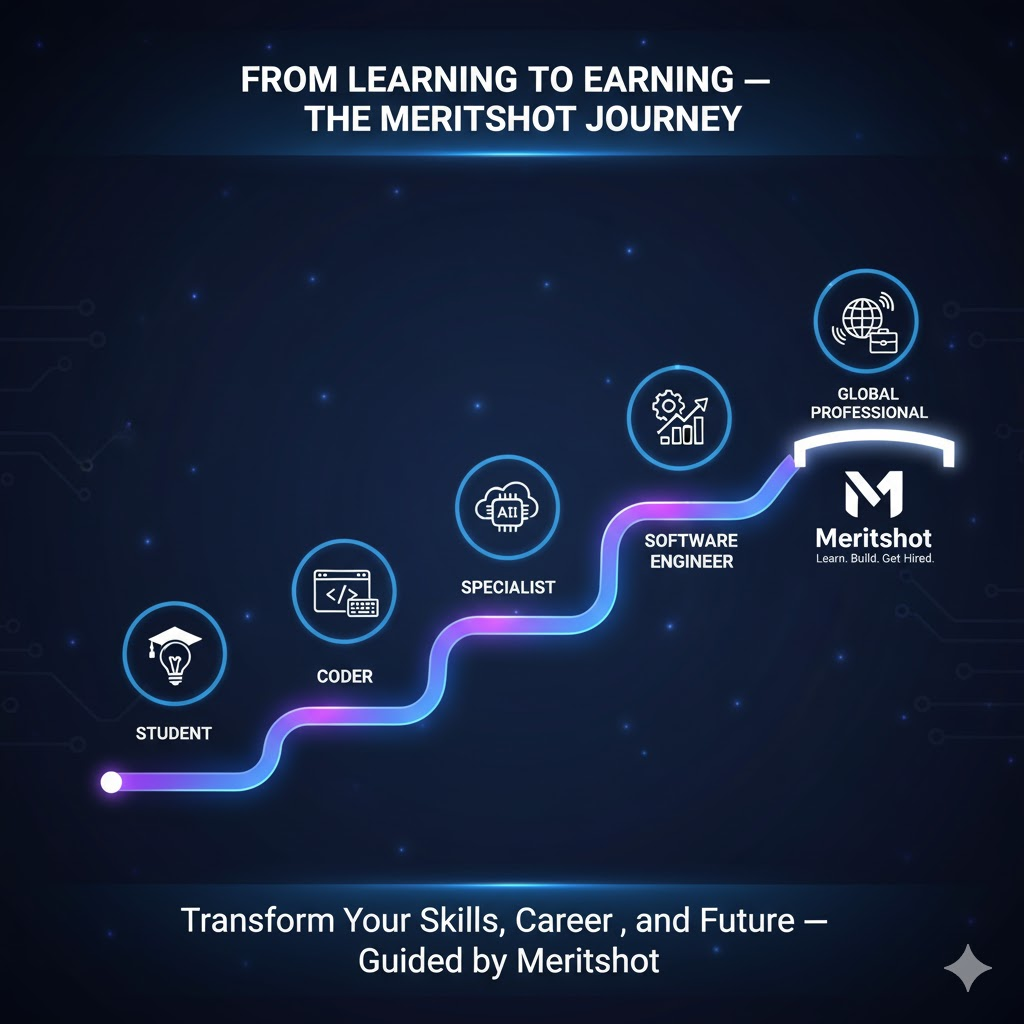
CONCLUSION
The world of software engineering is evolving faster than ever — and 2025–26 is full of opportunity.
Success now depends on one thing: building real, impactful work.
Don’t chase every new technology. Pick one path, start small, and build something real.
That’s how you turn skills into confidence and confidence into a career.
Every great software career starts with one project that works.
Start yours today with Meritshot — and be ready for the future of tech.
FAQs
1.How do I know which skill to start with - AI, Cloud, or Cybersecurity?
Think of it like choosing your adventure. AI is for those who love data, patterns, and predictive systems. Cloud is for builders who want to work on scalable, high-impact systems. Cybersecurity is for problem-solvers who enjoy defending systems and hunting vulnerabilities. A short exploratory project or roadmap session can make this choice easy.
2. Is coding still essential with AI tools?
Absolutely! AI can assist, but creative problem-solving and algorithmic logic remain irreplaceable.
3. How can I prepare for future tech roles?
Absolutely! AI can assist, but creative problem-solving and algorithmic logic remain irreplaceable.
4. Will completing this help me get a job in tech faster?
Yes. A strong software engineering portfolio, real project experience, and mentor feedback make job applications stand out. This approach speeds up entry into roles in AI, cloud, or cybersecurity.
5. Which tech skills will be most valuable in 2026?
The top skills in 2026 will include machine learning & AI model development, cloud architecture & automation, cybersecurity engineering, and full-stack software development. Alongside technical skills, employers will value the ability to deliver complete projects from design to deployment and clearly demonstrate impact through portfolios.
6.How do tech hiring trends impact salaries and remote work?
Tech hiring trends shape salaries and remote work opportunities. High-demand skills like AI, cloud, and cybersecurity often come with higher pay. Companies also increasingly offer remote roles to access global talent and stay competitive.
7.Why is AI expertise vital in tech hiring trends?
AI expertise is vital because AI drives innovation across industries, from healthcare to finance. Employers value AI skills for problem-solving, automation, and improving efficiency, making it one of the most sought-after skills in 2025–26


.png)
.png)




















